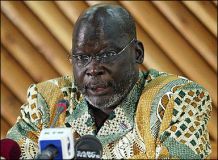Garang urges southern Sudanese factions to reconcile
NAIROBI, Apr 20, 2005 (IRIN) — The chairman of the southern Sudan People’s Liberation Movement/Army (SPLM/A), John Garang, appealed on Tuesday to all factions operating in south Sudan to put aside their differences and reconcile.

|
|
Chairman of the Sudanese People Liberation Movement (SPLM) John Garang, addresses delegates at a major reconciliation conference in Nairobi, April 19, 2005. (AFP). |
“It is time to heal wounds and work in an atmosphere of fraternity and mutual respect, in order to create a healthy political environment,” Garang said in a speech to the South-South Dialogue Conference taking place in Nairobi, Kenya’s capital.
“Dialogue will ensure that the benefits of the Comprehensive Peace Agreement [CPA] signed on 9 January in Nairobi between the SPLM [/A] and the Khartoum government are enjoyed by all Sudanese for a long time,” he added. “This is a rare opportunity to create greater unity of our people.”
Tuesday’s conference was meant to bring together more than 20 armed groups from south Sudan to develop a consensus on issues ranging from security, democracy and good governance to human rights, gender equality and economic development.
Chaired by former Kenyan President Daniel arap Moi, the conference was attended by members of Sudanese civil-society organisations, church groups and 11 political parties.
Participants said disagreements among southern Sudanese leaders had, in the past, led to the creation of many splinter groups, several of them supported by the Khartoum government.
Garang acknowledged that divisions, tribalism and a breakdown of law and order had caused much suffering in the region.
The SPLM/A leader, who negotiated the CPA with the government, told delegates that the accord would benefit them all – not only the SPLM/A or himself.
“The agreement belongs to every Sudanese, to all of you,” he said. “Our house has many rooms. There is a actually a lack of manpower. There is place for everyone.”
Included in the CPA were provisions for pulling Sudanese government troops out of the south, self-determination, power and wealth sharing and religious freedom.
A transition period of six years – after which south Sudan’s people would decide in a referendum whether or not to break away from the rest of Sudan – was also set out in the agreement.
“If Sudan will not fundamentally change, why should we choose to be second-class citizens?” Garang asked. “Our ideology is Sudanism, not Islamism or Arabism.”
Significantly absent from the conference were Gabriel Tanginya and Paulino Matib, both officers in the Sudanese army and leaders of militia groups which control oil-rich areas in the southern state of Upper Nile.
Observers feared that once Sudanese government troops withdrew from their southern positions in August, militias could try to fill the gap.
Garang said he would bring up the issue of the officers when he returned to Khartoum, where he was now vice-president.
The leader of the delegation from Khartoum, Moses Machar – second vice-president of the ruling National Congress party (NC) – acknowledged that in more than 20 years of war, successive governments had failed to solve the problem in the south.
He urged the SPLM/A and the NC to cater for the needs of armed groups so that they could be reintegrated.
Archbishop Paulino Lukudu from the southern Sudanese city of Juba voiced concerns that southerners might not be able to govern themselves. “They don’t have the experience to live together – we hardly know each other,” he told the conference.
Teresa Sirisio, a women’s group delegate, complained about the lack of representation for women, saying women were suffering most in south Sudan, and that “their poverty is the catalyst for the HIV/AIDS killer.”
Garang said a donors conference in Oslo on 11-12 April had generated pledges of more than US $5 billion, which would be used for the development of government infrastructure, roads, railway lines, power plants, social services, education and agriculture in the south.
